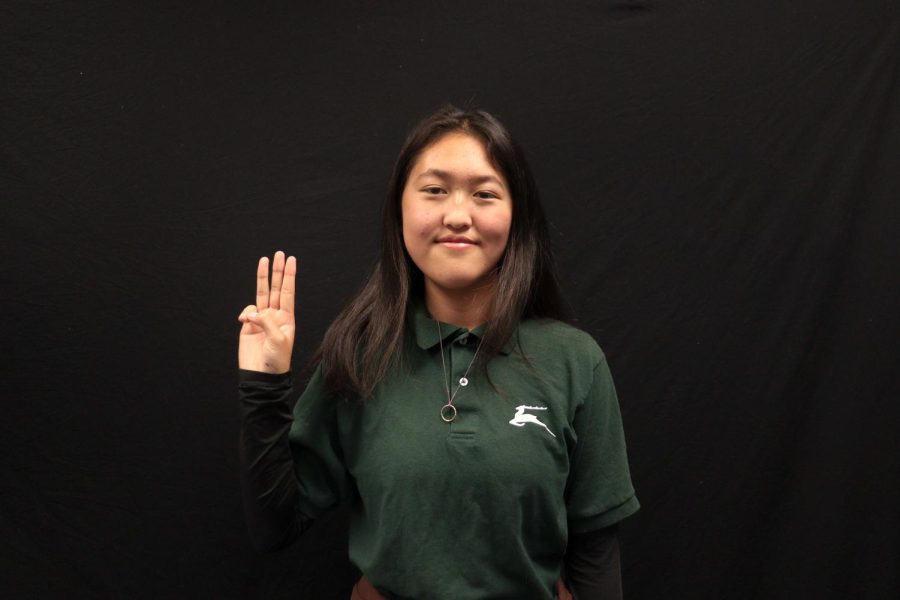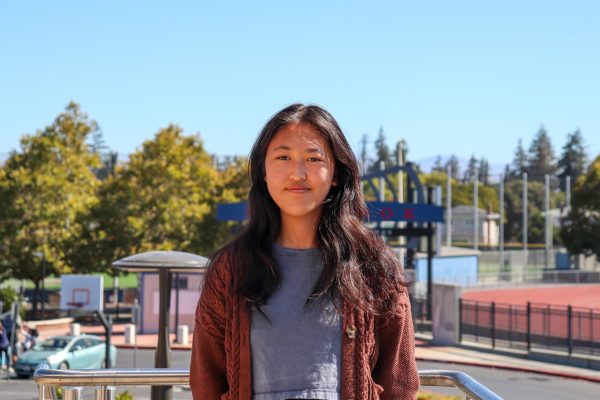Finding my calling as a camp counselor
Valerie poses with her scout sign, a signature gesture from her time at White Stag summer camp. Photo by Chelsea Lee
May 8, 2023
Lightning split the crimson sky as I aimed my flashlight into the gloomy dusk, surrounded by the chaotic voices of my campers while raindrops filled the air. Carrying heavy backpacking gear and half a week’s experience as a camp counselor, I scanned the storm approaching the mountainside during our first overnight hike with abject terror. The darkness made my campers blend in, but by now I could do a head count in my sleep. I took a shaky breath to calm my nerves before lifting my voice and taking the first steps down the rocky trail. “Follow me!”
Ever since joining White Stag Camp one summer as a shy middle schooler, I had dreamed of becoming a camp counselor. Despite never having pitched a tent in my life, I was enthralled by the spirited traditions, cozy campfires, starry night skies — and most of all, the people. As a scout-style outdoor and leadership camp, White Stag introduced me not only to invaluable skills, but also to a tight-knit community of volunteers dedicated to the same goals. Almost entirely youth-led, the camp’s teams of youth staff were amazingly knowledgeable and confident, inspiring me to one day be like them. Even so, it took me four years to work up the courage to join the staff at the beginning of 9th grade. I worked all year alongside a team of staffers to plan the camp’s logistics and schedules, while building skills to lead the groups of 10 to 13-year-old campers we would be in charge of in the upcoming summer.
However, nothing could have prepared me for my first day, where I was given a fast introduction to the complexities involved in managing a group of kids with a wide range of backgrounds and personalities. I soon discovered that my new campers’ favorite activities seemed to be either resisting my directions or squabbling with each other. Most unexpectedly, nothing could have prepared me for the assignment fluke that made shy, quiet Julie the lone girl in my group of rambunctious boys.
While I was eager to show my campers what White Stag had to offer, it seemed like the first few days were wasted mediating quarrels or coaxing reluctant kids into participating. During lessons, their attention seemed to fall through my hands like water. The doubts that had held me back from joining the staff for three whole summers returned to plague me as I lay exhausted, staring at the ceiling of my tent at night.
I felt like I was failing kids like Julie, who were actually eager to learn but had to endure conflicts of the group. But most of all, I felt like I was failing myself. I had joined the staff out of a desire to help and inspire others, in the same way that the camp had influenced me. Now, the long days of seemingly lost effort were brutally discouraging. Maybe I was better off in a regular summer program like my classmates, completing something to slap on my resume or college applications.
These doubts, fueled by panic and uncertainty, resurfaced on the night of the thunderstorm as I led my campers down that steep trail. The only thing that kept me from slipping was the determination to remain strong in front of them — to act as that guiding light I’d wished to be since my very first summer. And it was on this wet, dark hike where I heard something I would never forget from one of my youngest kids.
“Come on,” he was saying. “Come on, we can do it! Just stay positive, we can do this together!”
My campers — who had just this morning huffed up this trail at a snail’s pace, who had spent four long days refusing to work together — encouraged and helped each other on the trail all the way down.
I finally felt glad for the rain and darkness, because my campers couldn’t see my tears of excitement and relief.
Nothing could have prepared me for the challenges of being a counselor, but even more so, nothing could have prepared me for the payoff. Watching them pull together as a group, working together to overcome hurdles like the storm filled me with incredible pride. Seeing kids like Julie shed their shells and light up the group with their brightness and energy. Eagerly observing them apply the skills I’d taught — the very lessons that I’d struggled to keep afloat in the initial chaos.
But the growth that surprised me the most was my own: a kid who first stepped foot in White Stag as a timid 11-year-old too shy to even look at my groupmates, now facing hundreds of campers and parents as I presented Julie with the Most Outstanding Camper award.





























































randomrussianspeakingchinesekidwhodoesn'tevengotothischool • May 8, 2023 at 6:47 pm
white stag ftw 😀